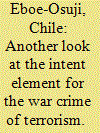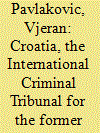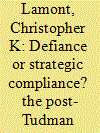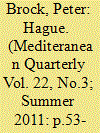| Srl | Item |
| 1 |
ID:
108248


|
|
|
|
|
| Publication |
2011.
|
| Summary/Abstract |
The modern basis of the war crime of terrorism may be found in the terms of article 51(2) of Additional Protocol I (1977) to the Geneva Conventions of 1949, replicated in article 13(2) of Additional Protocol II. The provision forbids attacks carried out for the 'primary purpose of spreading terror' among a civilian population. In view of this provision, the judges of the International Criminal Tribunal for the former Yugoslavia have pronounced terrorism to be a crime of 'specific intent'. In an extension of this reasoning, a Trial Chamber of the Special Court for Sierra Leone has recently held that the crimes of enslavement and militarization of children do not qualify as terrorism, because they were not found to have been committed for the 'primary purpose of spreading terror'. The aim of this paper is to examine the correctness and limits of the proposition that terrorism is a crime of specific intent. In the context of that inquiry, the Rome Statute is examined for what it is able to contribute to the discussion.
|
|
|
|
|
|
|
|
|
|
|
|
|
|
|
|
| 2 |
ID:
100288


|
|
|
| 3 |
ID:
100286


|
|
|
| 4 |
ID:
111247


|
|
|
|
|
| Publication |
2011.
|
| Summary/Abstract |
In its third year, the inquisition of Radovan Karadzic is supposedly nearing the halfway mark, as the prosecution is milking the dregs of its case in hopes of discovering a pearl of credibility - if not sanity - for the International Criminal Tribunal for the Former Yugoslavia at The Hague. It's a sure bet that by 2014 the appeal will be upheld for guilt of committing various war crimes. That assumes the tribunal still has a defendant, since two Serbian presidents and one Serbian mayor, among others, have died in ICTY custody. Who knows what the surreal judicial alchemy shall produce next? Certainly not "justice."
|
|
|
|
|
|
|
|
|
|
|
|
|
|
|
|
| 5 |
ID:
110905


|
|
|
|
|
| Publication |
2012.
|
| Summary/Abstract |
International criminal justice is a relatively new field of international law. For this reason alone, it excites curiosity. Minute traces of the new development are to be found in the years preceding the Treaty of Versailles. The provisions of that treaty relating to the subject were less than credibly performed. The International Military Tribunal caught the attention of jurists for a while, but thereafter the matter went in practice into a 50-year somnolence until re-awakened in 1993 by the establishment of the International Criminal Tribunal for the former Yugoslavia. The reason why an interest has to be taken in the subject exceeds the novelty of the field: it has to do with substance. The traditional immunity of presidents or heads of government, prime ministers and other functionaries acting in an official capacity no longer prevails; the doctrine of superior orders is inapplicable except, where appropriate, as in mitigation; and the gap between international armed conflict and internal armed conflict has closed. More generally, the bridge has been crossed between the responsibility of the State and the criminal liability of the individual. As a result, the traditional impunity of actors for the State has practically gone. Judge Wang Tieya helped in this process and merits grateful thanks.
|
|
|
|
|
|
|
|
|
|
|
|
|
|
|
|
| 6 |
ID:
081993


|
|
|
|
|
| Publication |
2008.
|
| Summary/Abstract |
Suspected war criminals who remain at large can do great damage to post-conflict, peace-building efforts. I develop a model of war criminal apprehension predicated on the behavior of international actors to alter the cost/benefit calculus of suspected war criminals and their supporters and make them either more susceptible to capture or make them more likely to surrender. I test this model with duration analysis using data from the International Criminal Tribunal for the Former Yugoslavia regarding the indictment and capture/surrender (if achieved) of over 100 individuals wanted for war crimes, crimes against humanity and genocide. The results demonstrate that not only is it possible to model these phenomena, but that there are a variety of actions the international community can take to facilitate the capture and surrender of suspected war criminals.
|
|
|
|
|
|
|
|
|
|
|
|
|
|
|
|
| 7 |
ID:
100282


|
|
|
| 8 |
ID:
114967


|
|
|
|
|
| Publication |
2012.
|
| Summary/Abstract |
If any nation seemed destined to succeed at painful post-war transitional justice, it was Serbia after the fall of Slobodan Milosevic. The country's seven million Serbs, even if they did not enjoy rule of law as they emerged from the brutal Balkan wars of the 1990s, did have established courts and other institutions that could be made to serve the interests of justice. They had a rambunctious civil society that deposed Milosevic (with the help of a mobilising election and the defection of some of his thugs) in 2000. In Zoran Djindjic they had a crusading prime minister who defied public opinion to extradite Milosevic to the International Criminal Tribunal for the Former Yugoslavia at The Hague in 2001. They had prosecutors willing to indict far more of their own ethnic group for war crimes committed in the 1990s Balkan wars than were neighbouring Croat, Bosniak (Bosnian Muslim) and Kosovar prosecutors. And the Serbs had the European Union next door to nurture and nudge their country toward democratic best practices on its way to eventual EU membership.
|
|
|
|
|
|
|
|
|
|
|
|
|
|
|
|
| 9 |
ID:
106538


|
|
|
| 10 |
ID:
055318


|
|
|
| 11 |
ID:
101090


|
|
|
|
|
| Publication |
2010.
|
| Summary/Abstract |
The president of the Republic of Croatia analyzes the progress made by his country since the end of the Balkan conflicts. He points to its progress toward European integration and provides advice for Croatia's neighbors on how to heal past wounds by looking to a future of cooperation that is free of narrow nationalistic agendas.
|
|
|
|
|
|
|
|
|
|
|
|
|
|
|
|